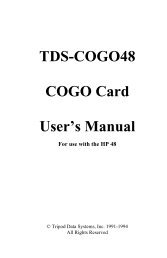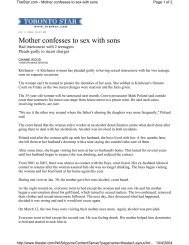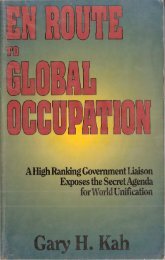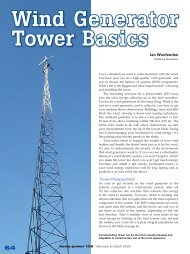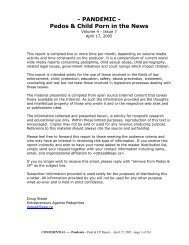G. Edward Griffin - The Fearful Master - PDF Archive
G. Edward Griffin - The Fearful Master - PDF Archive
G. Edward Griffin - The Fearful Master - PDF Archive
You also want an ePaper? Increase the reach of your titles
YUMPU automatically turns print PDFs into web optimized ePapers that Google loves.
And on the word politique his brown eyes, usually so disconcertingly<br />
blank, would flash.<br />
He and Mr. Gardiner [another UN official] did "make politics," throwing<br />
all semblance of non-intervention to the winds. . . . 14<br />
While the United Nations was pouring troops into Katanga, things were going from bad to<br />
horrible elsewhere in the Congo. On August 4, when Lumumba returned in a Russian<br />
plane from his grand tour of Belgium, the United States and England, he found<br />
unexpected opposition awaiting. Many of his former associates had decided they no<br />
longer wanted to be identified with either him or his politics. On August 10 Lumumba was<br />
seized and stoned by an angry mob in Leopoldville and barely escaped with his life. On<br />
August 25 more anti-Lumumba demonstrations and riots broke out all over the city. 15<br />
Meanwhile, a small group of former British army officers from Rhodesia had entered Kasai<br />
province and formed a volunteer corps of leaders to train Baluba tribesmen for battle<br />
against Lumumba's men. <strong>The</strong>y explained that they were sick of the West doing nothing to<br />
effectively fight the Congo's Reds. 16<br />
On September 5 Kasavubu, president of the central government and a rather weak-kneed<br />
politician (but not a Communist), dismissed Prime Minister Lumumba. Lumumba refused<br />
to acknowledge the action and promptly dismissed Kasavubu. At this point the lower<br />
house and the senate both convened illegally without a quorum. <strong>The</strong> house invalidated<br />
both dismissals. <strong>The</strong> senate declared its confidence in Lumumba. Complete confusion<br />
and anarchy reigned supreme.<br />
Finally, on September 14 a young army colonel by the name of Joseph Mobutu, using<br />
what military power be could muster, picked up the pieces and seized control of the<br />
government. Kasavubu threw his support behind him and they appointed a committee of<br />
college graduates to run things temporarily. A semblance of order once again returned.<br />
<strong>The</strong> "student council," as they were nicknamed, acting under the leadership of Mobutu<br />
and Kasavubu, did a far more effective job of restoring order than the official government<br />
under Lumumba had done.<br />
Here was obviously a bad turn of events for the Communists. <strong>The</strong>y had not planned on<br />
this. Mobutu promptly ordered all the Russian and Czechoslovakian "diplomats" and<br />
"technicians" to pack their bags and leave the country. Seeing power slip from him,<br />
Lumumba sought United Nations protection and quietly moved into the Guinean embassy.<br />
It is both interesting and significant that Lumumba chose this particular embassy for<br />
asylum. Mobutu had appealed to the United Nations to withdraw the Guinean and<br />
Ghanian contingents from its peace-keeping forces in the Congo because he had found<br />
letters in Lumumba's briefcase which clearly linked these troops with the Communists. 17<br />
It appeared to be common knowledge throughout the Congo that many of the United<br />
Nations soldiers were openly pro-Communist. <strong>The</strong>y were apparently selected for that<br />
reason. As Philippa Schuyler reported:<br />
. . . there have been many complaints from anti-Communists in the<br />
Congo that UN soldiers from certain left-leaning nations have been<br />
spreading leftist or Communist propaganda or otherwise actively aiding


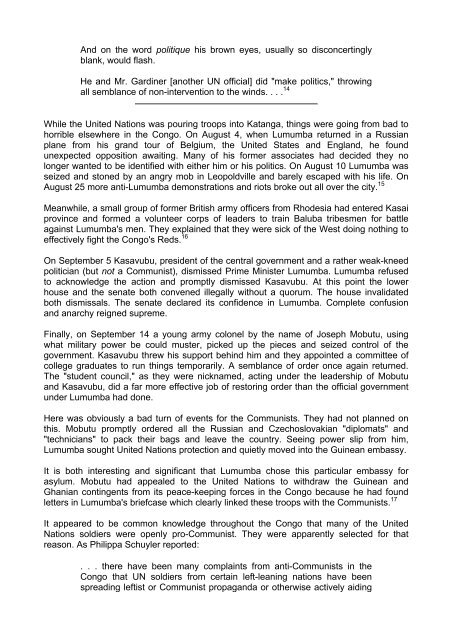
![Robert T McQuaid [rtmq@stn.net] Sent: Friday, October 29, 2004 12 ...](https://img.yumpu.com/51070071/1/190x245/robert-t-mcquaid-rtmqstnnet-sent-friday-october-29-2004-12-.jpg?quality=85)

